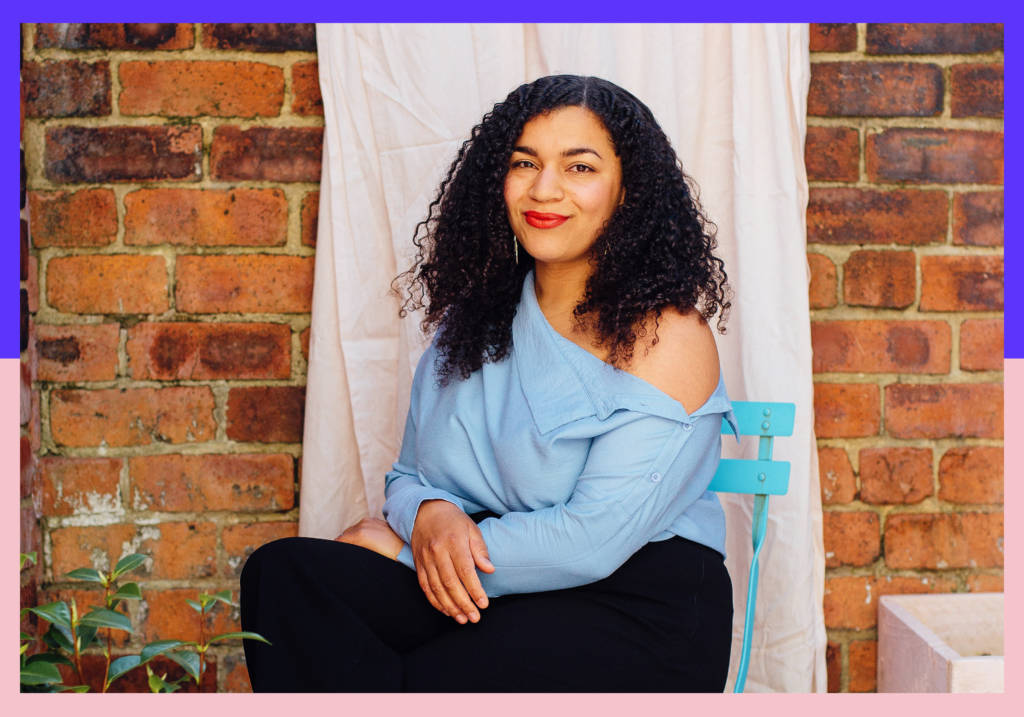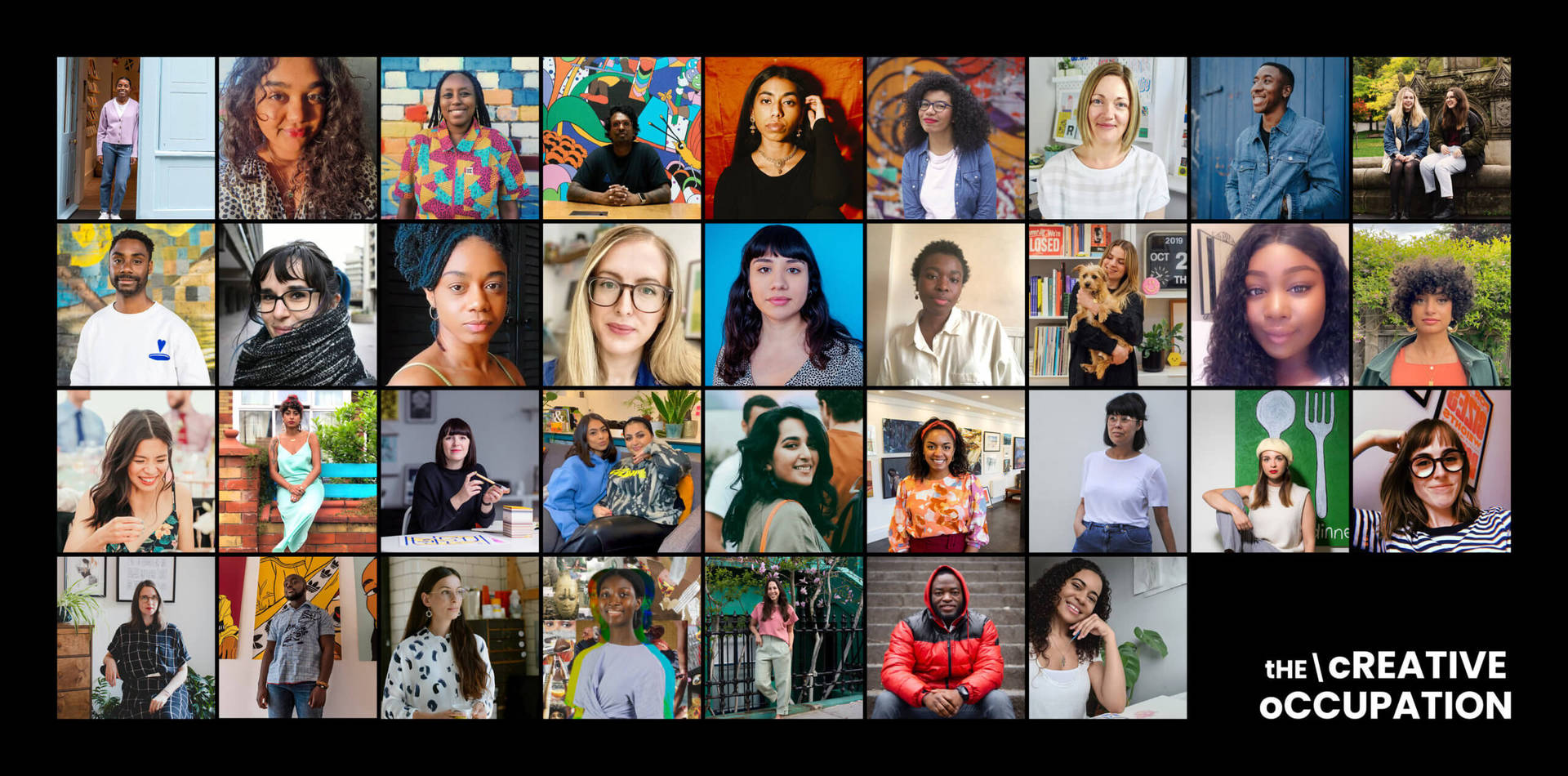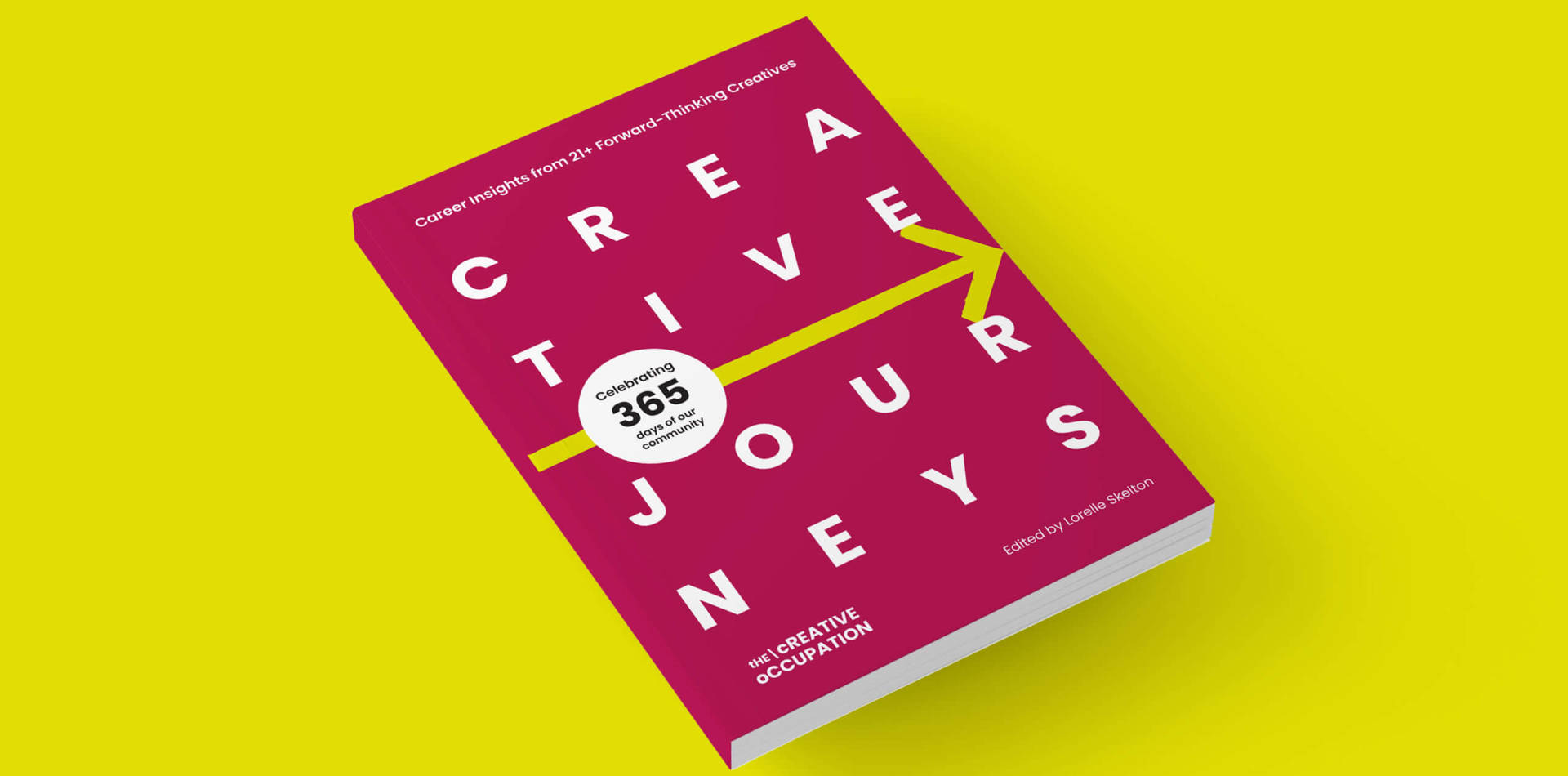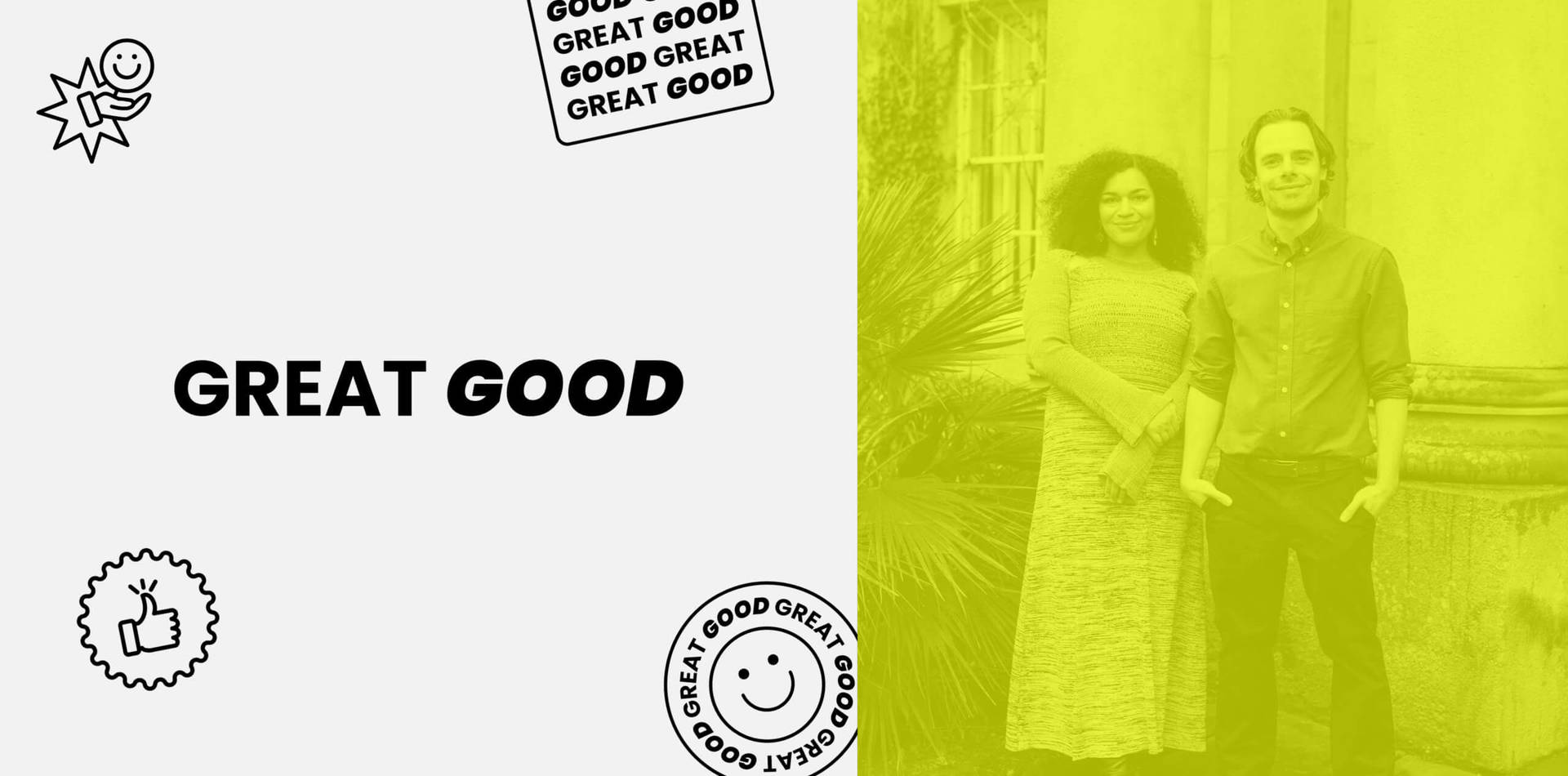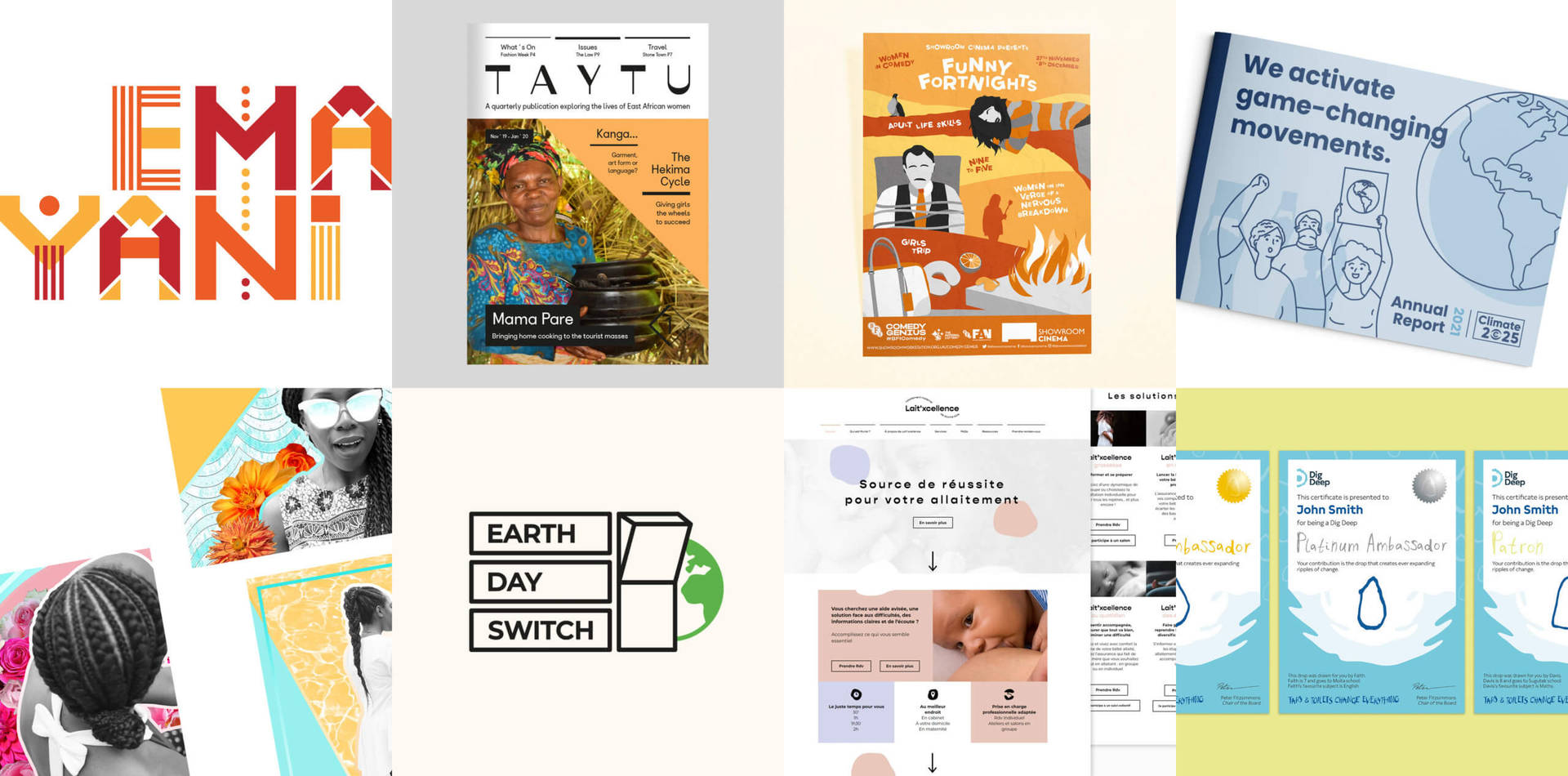Lorelle Skelton discovered her love for graphic design whilst working as a digital marketer and made a career change back in 2014. She completed the Graphic Design course at Shillington Education and hasn’t looked back since, working in both agency and in-house roles. She decided to take the plunge and founded her own studio Great Good, back in 2017, which she now co-runs with her husband, providing creative and consulting services for charities and not-for-profit organisations – a sector they are particularly passionate about. “There are a lot of incredible organisations out there doing literally world-saving work. If we can support them to connect with more people, I’ll sleep well at night!” Lorelle tells DbyW.
Facilitating positive change is an integral part of Lorelle’s practice and during the pandemic she launched the amazing initiative – The Creative Occupation (TCO). TCO is an inclusive community and platform where creatives can find support and guidance on their career journeys through mentoring, networking, and resources. As she tells us, the aim is to build, “a platform that feels welcoming and safe, enables creatives from all backgrounds to support one another, provides practical resources and advocates for a more diverse sector.”

We caught up with Lorelle to learn more about her motivations behind founding TCO and its aims, her career journey so far, and her thoughts on creating a more diverse and inclusive industry.
We’re big fans of The Creative Occupation (TCO). What were your main motivations behind founding the platform a year ago?
2020 was a year of flux. As a freelancer, having just had my first child and coming out of a period of lockdown, I felt I’d reached a crossroads. As I was trying to decide where my path should take me next, I found myself reflecting on my career so far and concluded that I’d missed out on the kind of networks and resources that would have seen me truly thrive. I delved into the statistics around both professional development and diversity in the creative industry, and what I found supported the growing feeling that I had; that more needed to be done to support our creative workforce, in particular, Black, Asian and Minority Ethnic (BAME) creatives…creatives like me.
So, you could say, the driving force behind the decision to launch The Creative Occupation (TCO) — an inclusive creative community — was the desire to create something that I wish I’d had access to early in my career. A platform that feels welcoming and safe, that enables creatives from all backgrounds to support one another, that provides practical resources and advocates for a more diverse sector. That’s what I’m working to build.
What is the overall ethos of The Creative Occupation and what are you hoping to achieve?
TCO’s mission is career support for all creatives; emphasis on the ‘all’, ‘support’ in the most far-reaching sense. I’m excited to discover what that support will look like in the future! Ultimately, I want to be able to help all creatives fulfil their potential and occupy more space in their chosen fields. Currently, we offer a resource library, mentoring opportunities, access to a directory of creatives, and a blog where we share career journeys from within our growing community, and beyond. The latter has proven to be a valued tool, and my favourite part of what we do! To celebrate our first anniversary recently, we released a free ebook – CREATIVE JOURNEYS: Career Insights from 21+ Forward-Thinking Creatives — featuring some of these thought-provoking and insightful journeys. It’s such a rich source of inspiration for creatives; I would love to create more resources like this. Looking to the future, I’d also love to do more to support underrepresented creatives. The Creative Majority report released by the APPG for Creative Diversity last year very succinctly outlines the problem. I would love for TCO to play a bigger part in the solution.
“Currently, we offer a resource library, mentoring opportunities, access to a directory of creatives, and a blog where we share career journeys from within our growing community, and beyond. The latter has proven to be a valued tool, and my favourite part of what we do!”
Have there been any insights you’ve discovered in doing the interviews that have particularly resonated with you?
So many. Heidi and Halah El-Kholy, the very first creatives interviewed for the blog, provided such an incredible insight into toxic workplaces and the power of taking a leap of faith, and staying true to your values. I’m a huge cheerleader for their young studio, Salt and Sister. I also learnt a lot from my chat with Jane Bowyer. She reminded me that the ‘you are not your thoughts’ ethos is integral to a joyful working life, and that not buying into their bulls**t is important work! Kei Maye is really inspiring, too. She’s been really honest and open about starting from a ‘dark place’ and now, nearly two decades later, she’s doing what she loves for a living having founded Creative Champs. She explained that she finally stepped into her power, something that I’m trying to do — it’s a work in progress.
What are your plans for the future of the TCO?
I tend not to make plans. I have ideas, and daydreams that mostly come to me while I’m trying to get my daughter to sleep! My only intention is to keep going, keep doing. There’s a balance I need to find, growing the community, growing my business and growing a tiny human. I hope TCO can continue to be a source of support for creatives well into the future though. I would love for our community to grow, and I’m really interested in bringing TCO into the physical world somehow. Watch this space!
We’d love to find out a bit more about you. What has your career path been like so far?
Getting a degree, any degree, seemed to be the definition of ‘success’ during my later school years, so I went to Manchester University to study English and Drama without really understanding why or what for. Luckily, I got my first job in digital marketing not long after graduating and it’s there that I discovered my chief vocation; Graphic Design. I left that role to study at Shillington back in 2014, then I landed my first design role at a Leeds agency, before moving on to work in-house at a global educational publishing company, where I rose to Chief Brand Officer.
In 2017 I bit the bullet and went freelance. Gradually my niche started to emerge and now I’m proud to work exclusively with the third sector. I mostly deal with branding and have worked with a whole host of organisations, covering climate justice, water and sanitation, women’s empowerment, ethical tourism, education, health and well-being, and arts and culture. It’s an incredible feeling knowing that my work is having a positive impact and I’m finally really clear on what my values are, and the kind of work that aligns with them.
“It’s an incredible feeling knowing that my work is having a positive impact and I’m finally really clear on what my values are, and the kind of work that aligns with them.”
What are you up to right now workwise and where are you going in the next few years?
My husband is a charity Chief Exec and Trustee, and recently he and I decided to combine our skill sets, teaming up under the name Great Good; a one-stop-shop supporting charities and not-for-profit organisations. As long-time partners in life, and often work too, we’ve developed an intuitive relationship. We work really fluidly together, and we’re excited about bringing that same sensitivity to our clients. My hope is that, over the next few years, we can further strengthen our working partnership, build a solid reputation and, hopefully, contribute something really meaningful and impactful to the sector. There are a lot of incredible organisations out there doing literally world-saving work. If we can support them to connect with more people, I’ll sleep well at night!
Who or what inspires your work? Both your work for The Creative Occupation and your design work outside of that.
I mostly live in the digital world when it comes to my inspiration. I would love to get out and about more, but the reality is, ideas tend to flow most easily when I’m reflecting on things that I’ve seen or read on social media, or elsewhere online. When I’m working with a client, I try to really dig into their values and goals, but I’m sometimes led by subtleties, too. I’m interested in language and it’s amazing how often a clients’ choice of words can set me down an unexpected path. I think that spending so much of my time with a 2-year-old feeds into my process, too. There’s no doubt that becoming a mother has changed my creative outlook in a million ways. Having to switch between parenting and ‘working’ so readily really motivates me to seek out new ideas and innovative ways of working.
“There’s no doubt that becoming a mother has changed my creative outlook in a million ways. Having to switch between parenting and ‘working’ so readily really motivates me to seek out new ideas and innovative ways of working.”
Do you have any thoughts on how we can encourage greater diversity and inclusion across the creative industries?
I think representation is the first step. That is one of the main things I hope TCO is achieving; helping show how diverse the creative workforce can be, and how varied our individual journeys are. As a Northern Black woman from a working-class background, I’ve felt excluded, at one stage or another, by this industry. There was certainly a stark absence of people who share my hue working alongside, or above me, throughout my employed years. As an industry, we need to support access to mentors and networks, remove barriers, like unpaid internships and non-flexible working, and all do the work of understanding our unconscious biases. It’s not pleasant when you come face to face with your blind spots, but it’s very necessary if we’re going to build more inclusive creative industries.
“As an industry, we need to support access to mentors and networks, remove barriers, like unpaid internships and non-flexible working, and all do the work of understanding our unconscious biases. It’s not pleasant when you come face to face with your blind spots, but it’s very necessary if we’re going to build more inclusive creative industries.”
